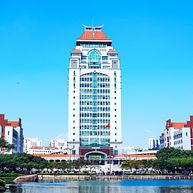
-
![person sitting in front of a laptop]() Provided by: Christin Hume/Unsplash
Provided by: Christin Hume/Unsplash

Our travel guides are free to read and explore online. If you want to get your own copy, the full travel guide for this destination is available to you offline* to bring along anywhere or print for your trip.
*this will be downloaded as a PDF.Price
€4,95
Internet Access and VPN in China
The guide was updated:Due to China's strict internet policies, access to many popular Western websites and apps—such as Facebook, Instagram, X (formerly Twitter), Google services (including Google Maps), Skype, and others—is restricted. These websites are blocked as part of the government's internet censorship efforts, commonly known as the 'Great Firewall'.
To bypass these restrictions, many travellers use a VPN (Virtual Private Network), which can help access blocked sites. However, it’s important to note that VPN use in China is legally complicated. While some VPN services are still used, unauthorized VPNs may be subject to scrutiny, and there have been reports of foreigners experiencing disruptions to their mobile service or being asked to visit the local police station if the use of a VPN is detected. It’s critical to comply with local laws and regulations regarding VPN usage. If you choose to use a VPN, ensure it’s approved by the Chinese government and used for legitimate purposes.
Since Google Maps is often unreliable in China due to restrictions on Google’s services, travellers should consider using local alternatives such as Baidu Maps and AutoNavi (Gaode Maps). These apps offer more accurate and comprehensive mapping and navigation within China. However, most of these services are primarily in Chinese, so it might be helpful to familiarise yourself with their basic functions or use translation tools. Baidu Maps, in particular, is widely used and provides detailed information about public transport, routes, and traffic.
Useful Information
Digital Travel Guide Download
Our travel guides are free to read and explore online. If you want to get your own copy, the full travel guide for this destination is available to you offline* to bring along anywhere or print for your trip.
*this will be downloaded as a PDF.Price
€4,95

Most travellers visiting mainland China are required to obtain a visa before arrival. Tourist visas (L visas) are typically issued for stays of up to 30 or 60 days and must be obtained in advance from a Chinese embassy or consulate.
Citizens of Japan, Singapore, and Brunei are permitted to enter China without a visa for stays of up to 15 days for tourism, business, or family visits.
Keep in mind that travellers who plan to visit Hong Kong or Macau in addition to mainland China may require separate visas for these regions, as they have different entry requirements from mainland China.
Visa and entry policies may change frequently. Be sure to confirm the latest requirements with your nearest Chinese embassy or consulate before travel.
Read more

Best Time To Visit
The best time to visit Xiamen is during spring (March to May) and autumn (September to November), when the weather is mild and comfortable for sightseeing. Summer, though warm and perfect for beach activities, also coincides with the typhoon season, so it’s important to check the forecast before planning your trip.
Read more

Internet Access and VPN in China
Due to China's strict internet policies, access to many popular Western websites and apps—such as Facebook, Instagram, X (formerly Twitter), Google services (including Google Maps), Skype, and others—is restricted. These websites are blocked as part of the government's internet censorship efforts, commonly known as the 'Great Firewall'.
To bypass these restrictions, many travellers use a VPN (Virtual Private Network), which can help access blocked sites. However, it’s important to note that VPN use in China is legally complicated. While some VPN services are still used, unauthorized VPNs may be subject to scrutiny, and there have been reports of foreigners experiencing disruptions to their mobile service or being asked to visit the local police station if the use of a VPN is detected. It’s critical to comply with local laws and regulations regarding VPN usage. If you choose to use a VPN, ensure it’s approved by the Chinese government and used for legitimate purposes.
Since Google Maps is often unreliable in China due to restrictions on Google’s services, travellers should consider using local alternatives such as Baidu Maps and AutoNavi (Gaode Maps). These apps offer more accurate and comprehensive mapping and navigation within China. However, most of these services are primarily in Chinese, so it might be helpful to familiarise yourself with their basic functions or use translation tools. Baidu Maps, in particular, is widely used and provides detailed information about public transport, routes, and traffic.
Read more

Xiamen Gaoqi International Airport (XMN)
Xiamen Gaoqi International Airport is located about 12 kilometres northeast of Xiamen's city centre, a journey that typically takes around 25 minutes by taxi under normal traffic conditions. Travellers can reach the city through several convenient transport options, including taxis, airport shuttle buses, or the Bus Rapid Transit (BRT) system.
Read more

Public Transport
Xiamen has a well-developed public transport system, including buses, trams, and a subway network, which is expanding. The subway is one of the best options for visitors, linking key attractions like Gulangyu Island and the city centre. Buses are extensive and affordable, though some routes may be challenging for non-Chinese speakers. A transport card, known as the Xiamen Public Transport Card, allows easy access to buses, the metro, and even taxis.
Read more

Taxi
Taxis are readily available in Xiamen, with most vehicles being orange or yellow. In addition to traditional taxis, ride-sharing apps like Didi, accessible via WeChat or Alipay, offer an easy and convenient way to get around, much like Western services such as Uber.
Read more

Post
In Xiamen, post offices typically operate from 8:30am to 6pm, Monday to Saturday. They offer a range of services, including domestic and international mail, parcel delivery, and money transfers. The Xiamen International Mail Exchange is the primary location for sending and receiving international parcels and letters. For general postal services, you can visit the main post office at 34 Haihou Road.
Read more

Pharmacy
In Xiamen, some of the main pharmacy chains include Yunnan Baiyao, Tong Ren Tang, and China National Pharmaceutical Group (Sinopharm). These chains are widely accessible across the city and offer a range of health products, including prescription medications, over-the-counter remedies, traditional Chinese medicine, and personal care items.
Read more

Telephone
Country code: +86
Area code: 592
Read more

Electricity
In China, the standard voltage is 220V at a frequency of 50Hz. There are three kinds of sockets widely used in Mainland China: type A, C, and I. Type C, which has two round pins, is the one commonly seen in most European countries.
Read more


